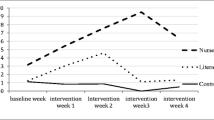Abstract
Children can be encouraged to demonstrate academic learning that they have mastered. Demonstrating academic learning to adults can be similar to auditioning for a drama or an artistic recital. Teachers and professional caregivers are accustomed to such auditions. Typically, it is the parents who initiate the audition: “My child can count to 10. Bonnie, count to 10 for this person.” Sometimes the auditioning child will ignore the parent: “Bonnie, count to 10 for this nice man.” Bonnie continues to disregard her parent. “Bonnie, count to 10. You know how to do it. One, two, three, ... What comes after three?” Bonnie still does not respond. “Honey, say your numbers. One, two, thr... What comes after two?”
Similar content being viewed by others
References
Baroody, A. J. (1987).Children's mathematical thinking: A developmental framework for preschool, primary, and special education teachers. New York: Teachers College Press.
Bruner, J. S. (1964). The course of cognitive growth.American Psychologist, 19 1–15.
Dienes, Z. P. (1966).Mathematics in the primary school. London: MacMillan.
Dienes, Z. P., & Golding, E.W. (1971).Approach to modern mathematics. New York: Herder & Herder.
Gibb, E. G., & Cataneda, A. M. (1975). Experiences for young children. In J. M. Payne (Ed.),Mathematics learning in early childhood (Yearbook of the National Council of Teachers in Mathematics). Reston, VA: National Council of Teachers of Mathematics.
Hiebert, J. (1984). Children's mathematical learning: The struggle to link form and understanding.Elementary School Journal, 84 497–513.
Payne, J. N. (1975).Mathematics learning in early childhood (Yearbook of the National Council of Teachers of Mathematics). Reston, VA: National Council of Teachers of Mathematics.
Piaget, J. (1941).The child's conception of numbers. New York: Norton.
Piaget, J. (1973).To understand is to invent: The future of education. New York: Viking.
Vrana, R. S. (1975).The mathematics laboratory: A new teaching approach. West Nyak, NY: Parker.
Additional information
Gerard Giordano is a professor in the College of Education, New Mexico State University in Las Cruces, NM.
Rights and permissions
About this article
Cite this article
Giordano, G. Play — Use — Generalize! Three-stage activities for developing math readiness. Early Childhood Educ J 17, 13–17 (1990). https://doi.org/10.1007/BF01623192
Issue Date:
DOI: https://doi.org/10.1007/BF01623192




